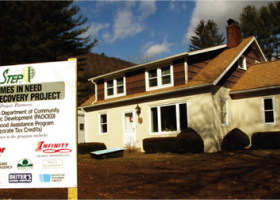
Community action agencies administer dozens of programs under one roof, making coordination a challenge and best practices a must. Lycoming-Clinton Counties Commission for Community Action (STEP, Inc.), in central Pennsylvania, is a model of integration, combining a whole house approach to home assessment with referrals to the 32 programs housed at the agency. The agency built this framework on a sustainable funding base of revenue from mortgage recordation transfer fees from the state’s Affordable Housing Trust. In fact, STEP’s Homes in Need program is exactly the kind of best practice the network should look to in uniting weatherization and other programs.
Incorporated in 1966, STEP is the third largest of 43 community action agencies in Pennsylvania. Although STEP is the core agency for Lycoming and Clinton Counties, it also provides services to 20 counties in central Pennsylvania. Both core counties have median household incomes lower than the Pennsylvania average.
The Homes in Need program exemplifies the agency’s success in seamlessly integrating weatherization and healthy homes through collaboration and referrals. Director of Planning Rachelle Abbott describes Homes in Need as an overarching program that accommodates a variety of funding sources, anchored by a site visit and full audit of a client’s home. The program began in 2005 as an effort to combine home repairs and accessibility modifications for income-eligible clients. To date, 150 households in 16 municipalities have been served, with a long wait list indicating both a need for the program and its value.
Eligible households receive an audit from a knowledgeable STEP housing specialist who develops a scope of work, screens for additional services, and provides client education about health and safety concerns in the home. STEP’s 25 field staff then carry out the housing interventions as prescribed by the work order.
Weaving health- and safety related referrals into the fabric of a weatherization audit makes Homes in Need a prime example of a Weatherization Plus Health strategy to integrate the Weatherization Assistance Program (WAP) with healthy homes interventions. In addition, an innovative approach to funding is critical. Since the program started, the core funding source has been revenue from mortgage recordation transfer fees, established under State Act 137, the Affordable Housing Trust. Funds from the Trust must be used to assist low-income homeowners. The funds are not dedicated to a particular agency or program but are intended for housing rehabilitation. STEP’s annual requests have been typically well supported, with a recent uptick in funding connected with land sales related to the development of natural gas reserves.
Revenue from the Affordable Housing Trust is supplemented by a diverse mix of public and private dollars, which varies somewhat from year to year, including support from federal programs such as the WAP, state and local programs, utility programs, and private foundations.
STEP’s leadership and vision in creating Homes in Need and utilizing WAP as its foundation has resulted in a successful and innovative locally grown program, with holistic home assessments, coordinated referrals, and sustainable funding providing an efficient and effective approach to weatherization and healthy homes.





